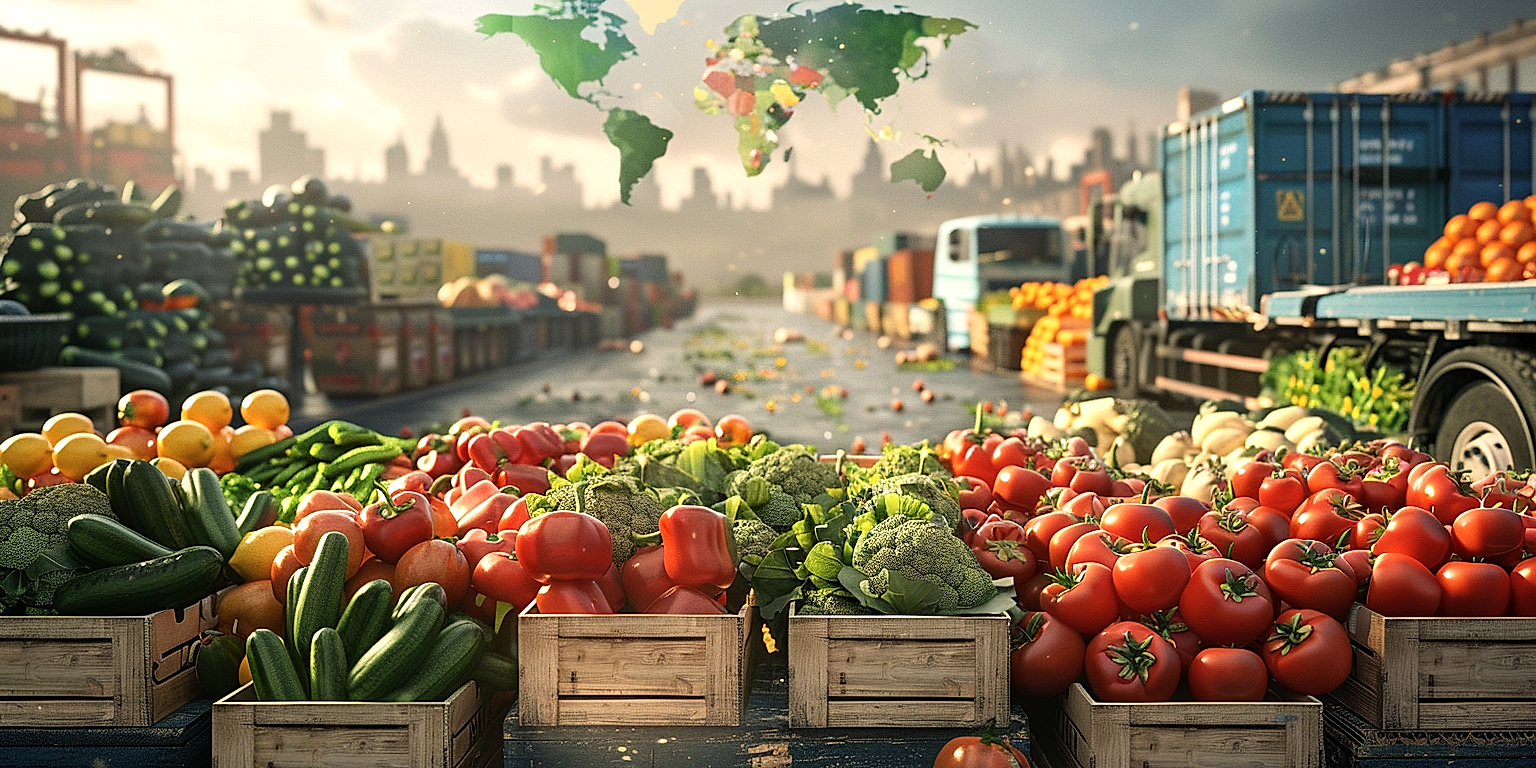As globalization continues to reshape the world’s economy, the dynamics of shipping and logistics, particularly in the produce industry, play a crucial role in determining competitiveness in global trade.
Regulatory measures and trade policies are principal drivers in establishing this competitive edge.
However, these policies and measures can create both opportunities and challenges for the produce shipping industry.
Understanding these trade policies is essential for successful operation in this sector.
Consequently, recognizing the potential impacts and mitigating risks can enable better strategizing and investment allocation.
In the following paragraphs, an in-depth analysis of these influential policies and their implications on the produce shipping business will be provided.
Trade Policies Impacting The Produce Shipping Business
1. Import and Export Tariffs on Agricultural Products
Tariffs have a significant impact on the import and export of agricultural products in the produce shipping business.
These taxes are placed on both imported and exported goods, predominantly to protect domestic industries from foreign competition.
Essentially, import and export tariffs are a form of regulation in international trade, implemented by governments.
The specific rates of these tariffs are usually determined in accordance with the nature of the product, its originating country, and other related factors.
It is also essential to consider that these tariffs can have a profound influence on the pricing of agricultural products in both the domestic and international markets.
For instance, an increase in import tariffs can lead to high-priced imported goods, making domestic produce comparatively cheaper.
This encourages consumers to opt for domestic items, thereby supporting local industry growth.
Furthermore, export tariffs can boost domestic supply by making it less profitable for local growers to export their produce.
As a knock-on effect, the increased supply can significantly reduce the produce prices in domestic markets.
However, it is crucial to note that imposing high tariffs can lead to trade wars, subsequently affecting the global economy.
In recent years, for instance, changes in global trade policies have led to a surge in tariffs, causing shifts in the produce shipping business.
The escalating tariffs between the United States and China — the world’s two largest economies — raised the price of U.S. grown produce in China, causing American farmers to lose their competitive edge in the Chinese market.
Notably, it is not just the produce growers who feel the blow; traders are also affected.
Produce traders, who deal with large volumes of agricultural products, are susceptible to the effects of fluctuating tariffs. Their profit margins can be severely eroded with any sudden increase in tariffs.
Thus, undoubtedly, import and export tariffs play a critical role in shaping the landscape of the produce shipping business worldwide.
2. Quarantine and Biosecurity Laws for Produce Transport
As a means to protect local agriculture, countries establish quarantine and biosecurity laws that regulate the transport of produce.
These laws enforce stringent testing and certification procedures to ensure that imported produce meets defined health and safety standards.
From a trade policy perspective, these biosecurity measures are important tools for managing risk linked to potential threats from pests and diseases.
Notably, these quarantine and biosecurity laws can greatly impact the produce shipping business as they dictate the processes, costs, and timelines associated with transporting agricultural goods across borders.
In some cases, stringent quarantine measures might hinder trade if they impose burdensome and costly requirements that exporters find difficult to meet.
This can primarily affect small to medium-sized enterprises (SMEs) that may struggle to cover these added costs.
In contrast, countries with lenient quarantine laws might run the risk of allowing harmful pests and diseases into their territories, potentially damaging their agricultural industries.
Therefore, achieving the right balance within these quarantine and biosecurity laws is key for sustainable and fair trade in agricultural produce.
Moreover, perceived unfairness or bias in these regulations can lead to trade disputes between nations.
For example, if Country A imposes tight biosecurity measures on produce coming from Country B, but not on similar produce from Country C, this could be viewed as an unfair trade practice by Country B.
In such situations, mediation and dispute resolution mechanisms under multilateral trade agreements come into play.
Whilst these laws are national measures, their implementation has global implications particularly for countries reliant on produce trade.
Thus, internationally accepted standards and norms, like those set by the International Plant Protection Convention (IPPC), have been established to coordinate and guide these measures.
Understanding and complying with these quarantine and biosecurity laws, therefore, is crucial in the produce shipping business.
In navigating these laws, businesses need to factor in all associated procedures and costs when making trade and transport decisions.
Continued compliance also fosters a sense of reliability and integrity, which can be a valuable asset for businesses in the global produce shipping industry.
3. Regional Trade Agreements Impacting Tariffs
The global shipping business, inclusive of produce transport, is substantially impacted by regional trade agreements.
These agreements, which include terms on tariffs and trade regulations, inevitably affect the cost, viability, and efficiency of transporting produce in and across different regions.
Signing of a Free Trade Agreement (FTA), for instance, can substantially reduce or even eliminate tariffs between the signing countries.
This will significantly boost the competitiveness of produce exported from these countries.
In essence, an optimal regional trade agreement should aim to promote trade liberalization and remove tariff and non-tariff barriers.
However, even FTAs sometimes include complex rules of origin,
These rules may raise the cost of conducting business and nullify the advantages of lowered or eliminated tariffs.
Further, some regional trade agreements may protect certain types of products or industries through the imposition of anti-dumping and countervailing measures.
Such measures can raise the cost of exporting produce, making it harder for produce shipping businesses to compete effectively in protected markets.
Conversely, regional trade agreements that remove trade protections may expose domestic produce growers to intense competition from imports.
This may necessitate the provision of government subsidies to sustain these domestic growers.
Nevertheless, regional trade agreements that fail to address subsidies may cause market distortions, leading to unfair competition.
These distortions may disadvantage produce exporters from countries that cannot afford to provide their growers with such subsidies.
Finally, while regional trade agreements can harmonize trade practices across the region,
The intricacies of adhering to these regulations can also pose additional operational challenges to produce shipping businesses.
Therefore, it’s clear that a balance must be struck when forming these agreements, in order to ensures fair and equitable trade across all involved nations.
4. Subsidies for Domestic Produce Growers
Domestic produce growers are a critical part of the national food supply chain, significantly influencing the local economy as they contribute towards maintaining food security and creating employment opportunities.
Government subsidies for these domestic producers are an integral part of trade policies, functioning to support and stabilize the agriculture sector.
The primary goal of subsidies is to manage the agricultural market, protect domestic producers against volatile world prices, and ensure a steady income for farmers.
The subsidies provided to domestic produce growers can significantly impact the dynamics of the produce shipping business.
The forms of subsidies can range from direct payments, cost-sharing for purchasing new equipment, assistance programs, and price guarantees, among others.
Subsidies can help domestic growers produce crops at a lower cost which can considerably affect the cost-effectiveness of the shipping process as well.
For instance, if the cost of producing a crop is reduced, the shipping business can be more profitable even if the selling price of that product in the international market is low.
On the other hand, subsidies may lead to an oversupply of certain commodities causing market prices to depress.
The global trading system often discourages subsidies as they distort the fair competition between domestic and international producers.
If heavily subsidized domestic products are dumped into another country’s market at a much cheaper price, it puts the local producers in the importing country at a disadvantage.
Thus, subsidies can significantly influence the patterns and paths of produce shipping all over the world.
In regions where there are fewer or no subsidies, growers might experience higher costs which puts them at a competitive disadvantage in the global market.
High tariff barriers are sometimes put up by countries to protect their own domestic industries from these unfairly subsidized imports.
This in turn, can lead to trade wars, affecting the overall business climate and stability of the produce shipping industry.
At a micro-level, subsidies can determine a farmer’s decision about which crops to grow in a particular season, indirectly affecting the produce available for shipping.
Overall, understanding how subsidies work and the potential implications can enable stakeholders in the produce shipping business to make informed decisions and strategies.
5. Anti-dumping and Countervailing Duties Measures
One of the most significant aspects of trade policies that directly impact the produce shipping business is Anti-dumping and Countervailing Duties measures.
Anti-dumping measures are established to discourage the selling of imported goods at a price lower than their normal value in the exporting country.
This is often done with the intention of driving domestic producers out of business and dominating the market.
Due to this, anti-dumping measures play a crucial role in protecting domestic produce growers from unfair competition.
On the other hand, Countervailing duties are imposed to offset subsidies provided by foreign governments to their exporters.
These duties serve as a balancing factor, neutralizing the price advantage that these subsidized products would otherwise have on the market.
Anti-dumping measures and countervailing duties are therefore key tools in maintaining a level playing field in the international produce shipping industry.
Both measures are governed by the rules of the World Trade Organization (WTO), ensuring that all member countries maintain fair trading practices.
A violation of these practices can lead to trade disputes and sanctions, which can, in turn, affect the produce shipping industry.
For instance, a country found to be engaging in dumping or unfairly subsidizing its exporters can have increased duties imposed on its exports.
The intent is to deter such unfair practices, but it can also result in higher costs for the produce shipping business.
Anti-dumping and countervailing duties measures, therefore, contribute to the complex landscape of international trade policies.
Understanding these measures and how they are implemented can help business operators navigate the challenges they present.
It’s also worth noting that these measures can change as trade policies are reviewed and updated, which underscores the need for businesses to remain current in their understanding of global trade practices.
Ultimately, the ability to adapt and react to these measures can significantly influence the success or failure of businesses within the produce shipping industry.
The Bottom Line
This analysis spanning import and export agricultural tariffs to subsidies for homegrown growers signifies a complex economic landscape surrounding the agriculture sector.
Biosecurity laws and quarantine measures add additional layers of regulation, ensuring safety but also affecting efficiency, cost, and market accessibility.
Furthermore, regional trade agreements alter tariff scenarios, either amplifying or mitigating economic effects.
Measures like anti-dumping and countervailing duties present another attempt to bring fairness to the global stage, although they too can be double-edged swords.
As such, policy makers, farmers, and trade partners must calibrate their decisions with the nuance of each of these factors for sustainable and equitable agribusiness growth.




